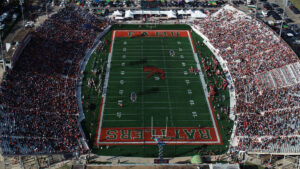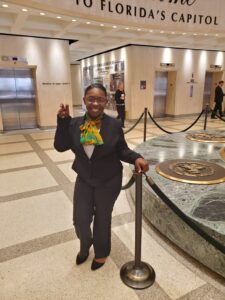
Florida A&M’s Bragg Memorial Stadium could face severe damage from Formosan termites. A student research club is credited with discovering the termites and its efforts may prevent further damage to the aging stadium.
The club is part of Teaching Our Youths Science, an outreach organization on campus. It began four years ago as a way to provide research opportunities to students needing research for medical school or graduate studies.
Since 2017, STEM students at FAMU have partnered with the Florida Department of Agriculture and Consumer Services (FDACS) to conduct research about this invasive species.
Current sitting club president Nyasia Haynes sees the group as a conduit to broader horizons.
“This research club offers opportunities to STEM majors who may need it to go to medical school or seek higher education,” she said.
Former president L’Ariel Wilson also credits the termite study with giving her a boost to where she wants to be.
“The termite club gave me a chance to showcase my leadership skills, and it aligned perfectly with

my major because I was able to get biological research experience which I can now use in my professional career,” she said.
To gather data on the termites, traps are posted around Tallahassee, including on FAMU’s campus during the major swarm season, which is May and June. The traps are collected weekly to determine the peak swarming weeks and are correlated with the local weather that week.
Haynes provided more details as to what goes into setting up the traps and what they get out of it.
“The trap is on this long red stick and it has this sticky stuff on it to catch the termite. This type of termite is attracted to light, so it’s basically set on a streetlight pole and it’s collected weekly to see if there was a swarm and what type of weather occurred during the swarm,” she said.
According to the FDACS Formosan Termite Alate Trapping Report for Leon County data from 2017 to 2019, 4 out of the 10 traps set tested positive for Formosan termite alates.
Haynes recalls a bit of data she and her club collected from a report in 2019.
“Last year, there was a big swarm during the week of May 29, the temperature was about 91 degrees, the humidity levels were at about 90, the wind speeds were about 10 mph and the barometric pressure was about 29.95 and there wasn’t really any rain,” she said.
In 2019, the Formosan termite was confirmed at Bragg Memorial Stadium. This species is a threat to FAMU’s grounds.
According to Pest World, Formosan termites, often referred to as “super termites,” are the most voracious, aggressive and devious of more than 2,000 termite species known to science, chewing through wood, flooring and even wallpaper undetected. The harm and damage this species could inflict on campus could be devastating, costing tens of thousands of dollars to repair.
Haynes sees the data as a positive to take preventative measures to preserve the integrity of FAMU’s infrastructures.
“This type of thing is important since we have wooden structures on campus and Formosan damage is known to be very costly to treat if treatment is even available,” she said.